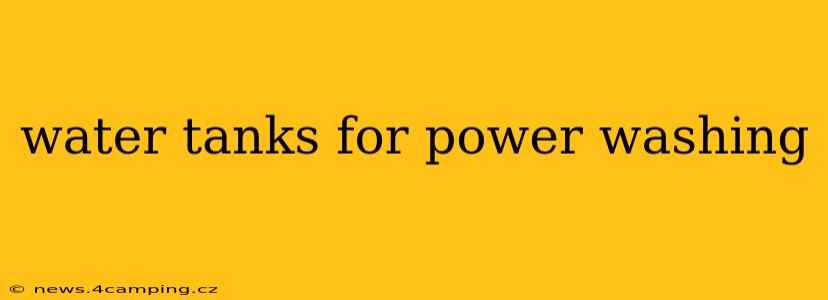Power washing is a demanding task, requiring a consistent and substantial supply of water. A reliable water tank is crucial for maintaining pressure and ensuring a thorough clean, especially when working in areas with limited water access or when tackling large projects. This comprehensive guide explores the essential factors to consider when selecting a water tank for your power washing needs. We'll delve into the various types, sizes, and materials available, ensuring you make an informed decision that maximizes efficiency and minimizes hassle.
What Size Water Tank Do I Need for Power Washing?
The ideal water tank size hinges on several factors: the frequency of your power washing jobs, the size of the areas you typically clean, and the power washer's gallons-per-minute (GPM) rating. For infrequent, smaller jobs, a smaller tank might suffice. However, for larger projects or frequent use, a larger capacity is essential to prevent constant refills. Consider the duration of your typical cleaning sessions and plan accordingly. A larger tank reduces downtime, enabling more efficient workflow.
What are the Different Types of Water Tanks for Power Washing?
Several tank types cater to various power washing needs:
1. Portable Water Tanks:
These are ideal for mobility and convenience. They come in various sizes and are frequently made of plastic, offering lightweight portability and resistance to corrosion. These are particularly useful for jobs requiring movement between locations.
2. Stationary Water Tanks:
These are larger tanks designed for fixed locations. They typically offer higher capacities and may be constructed from materials like plastic, metal, or even concrete, depending on the intended application and durability requirements.
3. IBC Totes (Intermediate Bulk Containers):
Often used for storage and transport of liquids, IBC totes are a cost-effective option for high-capacity water storage. They usually require a pump to deliver water to the power washer.
What Material is Best for a Power Washing Water Tank?
The choice of material depends on factors such as durability, longevity, and chemical compatibility.
1. Plastic (Polyethylene):
Plastic tanks are lightweight, relatively inexpensive, and resistant to corrosion. They are widely available in various sizes and are suitable for most power washing applications.
2. Stainless Steel:
Stainless steel tanks are incredibly durable and resistant to rust and corrosion. They are ideal for harsh chemicals and demanding environments. However, they are significantly more expensive than plastic options.
How Much Does a Water Tank for Power Washing Cost?
The price of a water tank varies considerably depending on size, material, and features. Small portable plastic tanks can be purchased for relatively low costs, while larger, more durable stainless steel tanks or IBC totes can be significantly more expensive. Always factor in the overall cost versus the long-term benefits of a more robust and higher-capacity tank.
Can I Use a Regular Water Tank for Power Washing?
While you can potentially use a standard water tank, it's crucial to ensure it's suitable for the pressure and volume demands of your power washer. A tank not designed for such use might leak, crack, or even fail under the pressure, causing damage and potential injury. Always prioritize tanks explicitly designed or suitable for power washing applications.
What are the Benefits of Using a Water Tank for Power Washing?
Using a dedicated water tank offers several significant advantages:
- Increased Efficiency: Reduced downtime from constant refills allows for uninterrupted cleaning.
- Water Conservation: Pre-filling allows for mindful water usage, especially important in water-restricted areas.
- Mobility: Portable tanks offer flexibility to clean in various locations.
- Pressure Consistency: A consistent water supply ensures consistent cleaning power.
- Convenience: Access to sufficient water is critical for completing large projects smoothly.
Choosing the right water tank for your power washing needs ensures a more efficient, cost-effective, and convenient cleaning experience. By carefully considering the factors outlined above, you can make an informed decision that perfectly suits your requirements and budget.
